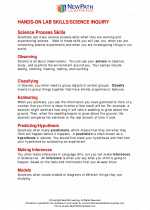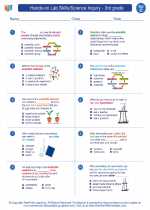Sedimentation
Sedimentation is the process by which particles settle out of a liquid or gas and form a sediment. This occurs when the force of gravity pulls the particles down towards the bottom of the liquid or gas. Sedimentation is a key process in the formation of sedimentary rocks and plays a crucial role in the Earth's geology.
Factors Affecting Sedimentation
There are several factors that can affect the process of sedimentation:
- Particle Size: Larger particles tend to settle more quickly than smaller particles.
- Density: More dense particles will settle faster than less dense particles.
- Viscosity of the fluid: The thicker the fluid, the slower the sedimentation process.
- Temperature: Warmer temperatures can increase the rate of sedimentation.
- Presence of organic matter: Organic matter can affect the settling of particles.
Importance of Sedimentation
Sedimentation is important for a variety of reasons:
- Formation of Sedimentary Rocks: Sedimentation is the first step in the formation of sedimentary rocks, which make up a large portion of the Earth's crust.
- Water Treatment: Sedimentation is a key step in the process of purifying water, as it allows for the removal of suspended particles.
- Environmental Indicators: The study of sedimentation patterns can provide valuable information about past environmental conditions and geological history.
Study Guide
Here are some key points to remember when studying sedimentation:
- Define sedimentation and explain the process.
- List and describe the factors that can affect sedimentation.
- Explain the importance of sedimentation in the formation of sedimentary rocks.
- Discuss the role of sedimentation in water treatment processes.
- Explain how the study of sedimentation patterns can provide insights into Earth's history and environmental conditions.
Understanding sedimentation is crucial for understanding the formation of rocks, environmental processes, and Earth's history. Take the time to review and understand these key concepts to master the topic.
[Sedimentation] Related Worksheets and Study Guides:
.◂Science Worksheets and Study Guides Third Grade. Hands-on Lab Skills/Science Inquiry - 3rd grade
Study Guide Hands-on Lab Skills/Science Inquiry - 3rd grade
Hands-on Lab Skills/Science Inquiry - 3rd grade  Worksheet/Answer key
Worksheet/Answer key Hands-on Lab Skills/Science Inquiry - 3rd grade
Hands-on Lab Skills/Science Inquiry - 3rd grade  Worksheet/Answer key
Worksheet/Answer key Hands-on Lab Skills/Science Inquiry - 3rd grade
Hands-on Lab Skills/Science Inquiry - 3rd grade  Worksheet/Answer key
Worksheet/Answer key Hands-on Lab Skills/Science Inquiry - 3rd grade
Hands-on Lab Skills/Science Inquiry - 3rd grade  Worksheet/Answer key
Worksheet/Answer key O-W-L
O-W-L  Vocabulary/Answer key
Vocabulary/Answer key Hands-on Lab Skills/Science Inquiry - 3rd grade
Hands-on Lab Skills/Science Inquiry - 3rd grade  Vocabulary/Answer key
Vocabulary/Answer key Hands-on Lab Skills/Science Inquiry - 3rd grade
Hands-on Lab Skills/Science Inquiry - 3rd grade 

 Worksheet/Answer key
Worksheet/Answer key
 Worksheet/Answer key
Worksheet/Answer key
 Worksheet/Answer key
Worksheet/Answer key
 Worksheet/Answer key
Worksheet/Answer key
 Vocabulary/Answer key
Vocabulary/Answer key
 Vocabulary/Answer key
Vocabulary/Answer key

The resources above cover the following skills:
Science as Inquiry and Process: A student should understand and be able to apply the processes and applications of scientific inquiry. A student who meets the content standard should:
Develop an understanding of the processes of science used to investigate problems, design and conduct repeatable scientific investigations, and defend scientific arguments.